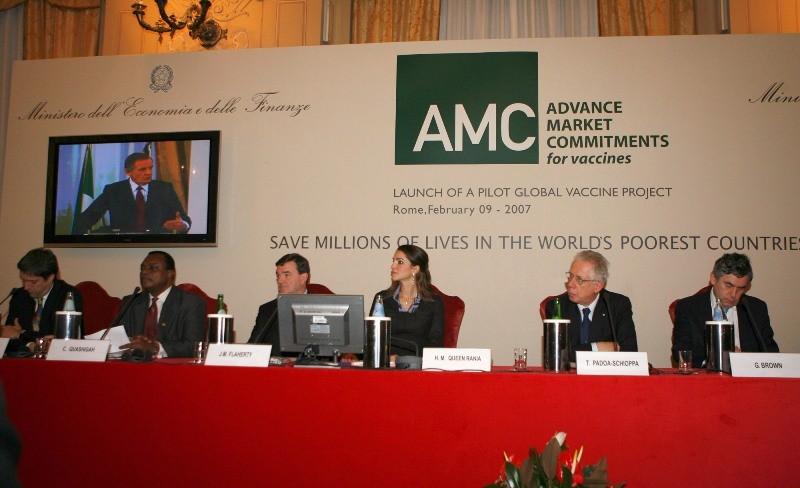Queen Rania, GAVI Secure Funding for Vaccine Development

(Office of Her Majesty – Press Department – Rome) - Her Majesty Queen Rania Al Abdullah of Jordan, a board member of the GAVI Fund, joined finance ministers and other officials in launching the new Advanced Market Commitment (AMC) for Vaccines program, a groundbreaking initiative to save the lives of millions of children in the world's poorest countries by providing an estimated $1.5 billion to fund vaccine development.
The governments of Canada, Italy, Norway, Russia, and the United Kingdom launched the first AMC, which is expected to save the lives of 5.4 million children by 2030.
The pilot represents the first step in a historic effort to create a market for life-saving vaccines for children in the world’s poorest countries. The new initiative will target pneumococcal disease, a major cause of pneumonia and meningitis that kills 1.6 million people every year.
A video clip was played during the announcement that illustrated the urgency of developing such vaccines. It noted that every minute, one child dies of pneumococcal disease, an unacceptable human tragedy that Italian Finance Minister Tommaso Padoa-Schioppa called "an appalling obstacle to human development."
"You are giving the gift of health, and, more than that, the gift of hope," said Queen Rania in support of the initiative. "Thanks to you, more families will have a fighting chance to see their babies survive, to see their boys and girls grow up, their sons and daughters live productive lives. Thanks to you, entire communities may find the strength to push back against poverty and entire countries may take a step up the ladder of human development."
Queen Rania and ministers including finance ministers of Canada, Italy, Norway, Russia, and the United Kingdom, as well as Paul Wolfowitz, President of the World Bank, announced the pilot AMC, which will test a new model for spurring development of vaccines, specifically those that prevent disease strains prevalent in developing countries.
The pilot will provide 7 to 10 years of funding to support future vaccines against pneumococcal disease. Vaccine companies that participate in the AMC must promise to eventually sell the new vaccine at a price that will be affordable to cash-strapped governments in Africa, Asia, and South America.
Major Courage Quarshiga, Minister of Health of Ghana, gave a personal account of why these governments need such a program. “112 children out of every 1,000 die in Ghana before the age of five. It is frustrating to know that these vaccines exist, but we don't have access to them."
GAVI, an institution that Julian Lob-Levyt referred to as "a remarkable public-private partnership," has managed to merge its commitment with the advance know-how of the pharmaceutical industry to secure funding for urgently needed vaccines in the poorest countries, where thousands of children die every day from preventable diseases.
"With your support for additional pneumococcal vaccines, we can stop this tragic loss of life, and start building tomorrows instead," said Her Majesty. "By putting your faith and finances in this solution, you are helping break down the barriers of health inequality between rich and poor."
The AMC concept was developed in response to a tragic dilemma, noted Italian Finance Minister Tommaso Padoa-Schioppa.
"With the lives of millions of children at stake, developing nations are in desperate need of new vaccines," said Padoa-Schioppa, whose ministry has led the drive to adopt the AMC pilot. "But they often lack the buying power that would encourage vaccine makers to take the financial risk of developing products to meet their needs."
The AMC for pneumococcal disease will offer an improved market for vaccines now in development. Vaccines are bought only if they meet pre-determined standards of efficacy and safety, and if developing countries ask for them.
In return, the companies must agree to provide their products at a reduced price that will decline over time as the market grows and becomes more efficient. After 7 to 10 years, AMC funding will phase out, and vaccine makers are expected to continue supplying the developing world marketplace with their products, but at a discounted price, set during the AMC process.
Queen Rania pointed out that in the poorest regions of the world, two to three million children die of preventable diseases every year. Her Majesty took particular note of the donor nations that are helping to meet the goal of reducing by two-thirds the number of deaths among the world’s most vulnerable children.
"This generation can begin to eradicate the worst of the world's diseases," said UK Chancellor Gordon Brown. He noted that finance ministers are usually the last people who willingly give away such vast amounts of money, but that "the appalling arithmetic of death and disease round the world has moved us all to action."
Lob-Levyt, executive secretary of the GAVI Alliance, noted that a pneumococcal vaccine is being widely used in developed countries with striking success in preventing disease. However, he added, manufacturers lack the capacity to provide this vaccine to the developing world on a large scale, and extended protection vaccines are needed to bring pneumococcal disease under control in developing countries.
The GAVI secretariat and the World Bank worked with an expert committee, with representation from developing and industrialized countries, to identify pneumococcal disease as the target of the AMC pilot. Going forward, the AMC will be overseen by an Independent Assessment Committee, which will set and monitor standards for the vaccines.
The GAVI Alliance and the World Bank will be responsible for supporting the programmatic and financial functions of the AMC. “We expect that new pneumococcal vaccines will reach developing countries by 2010, at least 10 years earlier than if the AMC were not available,” Lob-Levyt said. “Today’s decision will save lives by bolstering efforts to prevent this disease, while paving the way for future AMCs focused on other deadly diseases.”
Her Majesty thanked all the entities involved in this pilot project, saying "The challenges are daunting, but you have shown that overcoming them is doable…In these troubled times, your countries have shown humanity’s great capacity for good."
Featured
Queen Rania's official website
This website does not support old browsers. To view this website, Please upgrade your browser to IE 9 or greater
Your browser is out of date. It has known security flaws and may not display all features of this and other websites. Learn how to update your browser



